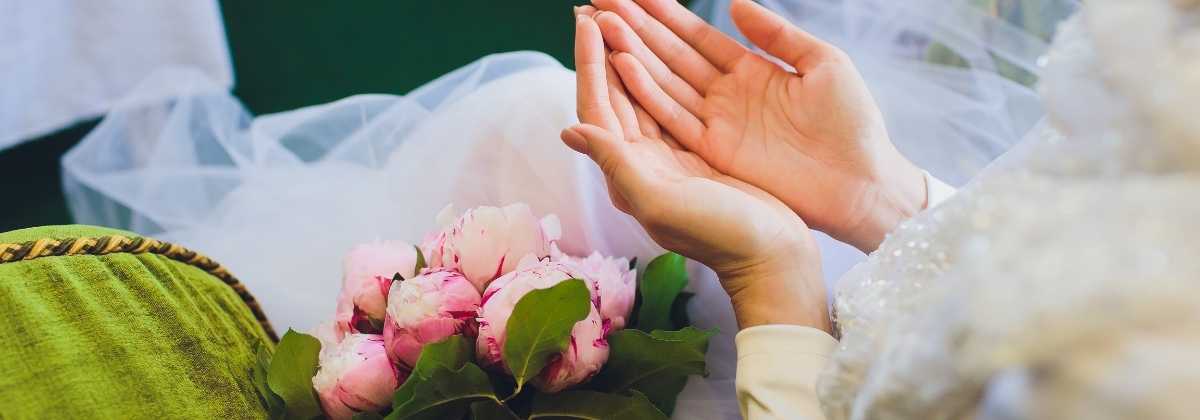
This contract is fully agreed upon by both parties. Both the husband and wife have the freedom to establish and include whatever terms and conditions they choose in this contract.
Mahr
Mahr (marriage gift) is a divine command. The groom's gift of mahr to the bride is a requirement of the contract.
'And give the women their mahr as a (nikah) free gift when they marry.' 4:4 in the Quran
Mahr is a sign of the husband's obligation that might be paid to the bride in cash, property, or transportable goods. Although the amount of mahr is not legally defined, it is recommended that it be moderated in accordance with current societal norms. The mahr may be paid to the bride at the day of the wedding, or it may be deferred until a later period, or it may be a combination of both. The postponed mahr, on the other hand, is due in the event of death or divorce.
One matrimonial partner announces "ijab" ready consent to marry, while the other expresses "qubul" acceptance of responsibility for the marriage ceremony's assembly. The bride and groom, as well as their two witnesses, write the contract and sign it. The public announcement of this written marriage contract ("Aqd-Nikah") follows.
Sermon
The Muslim officiating the marriage addresses the nikah assembly with a marriage sermon (khutba-tun-nikah). In most marriage cultures, the nikah ceremony is officiated by a state-appointed Muslim judge (Qadi), who also keeps track of the marriage contract. However, because Islam does not encourage clergy, any trustworthy practising Muslim can perform the nikah rite. Marriage contract/certificate documents are filed with the mosque (masjid) and local government for record keeping.
To solemnise the marriage, Prophet Muhammad (S) established a tradition (sunnah) of having a marriage sermon delivered in the assembly. The bride and groom, as well as the assembled guests, are encouraged to live a life of piety, mutual love, kindness, and social duty.
The praise of Allah begins the Khutbah-tun-Nikah. His assistance and advice are needed. 'There is none worthy of worship except Allah, and Muhammad is His servant and messenger,' declares the Muslim profession of faith. The core text of the marriage is made up of three Quranic verses (Quran 4:1, 3:102, and 33:70-71) and one Prophetic saying (hadith). This hadith is as follows:
'Allah willing! Despite the fact that I am the most God-fearing of all of you, and that I am the most qualified to save myself from Allah's wrath, I nevertheless observe prayer and sleep. I keep a close eye on them and then stop; I also marry women. And whomever rejects my Sunnah has no relationship with me." (Bukhari)
The Muslim conducting the wedding closes the ceremony with a prayer (Dua) for the bride and groom, their families, the local Muslim community, and the Muslim community at large (Ummah)
Marriage (nikah) is seen as a religious act (ibadah). It is virtuous to perform it at a Mosque with a little ceremony. The wedding ceremony is both a social and religious event. In rituals and festivities, Islam calls for simplicity.
Simple weddings, according to Prophet Muhammad (S), are the best marriages:
'The best wedding is the one with the least amount of bother and expense." (Mishkat)
Basic Requirements
The bride and groom come to an agreement (Ijab-O-Qubul).
Two adults who are both sane
Secondary Requirements: Mahr (marriage gift) to be provided by the groom to the bride either immediately (muajjal) or later (muakhkhar), or a combination of both.
A legal guardian (wakeel) for the bride is appointed.
The bride and groom sign a written marriage contract ("Aqd-Nikah"), which is witnessed by two adult and sane witnesses.
Ma'zoon (state-appointed Muslim judge) or Qazi
To solemnise the marriage, Khutba-tun-Nikah is performed.
The Wedding Reception (Walima)
The groom hosts a dinner called a walima once the marriage is consummated. Relatives, neighbours, and friends are invited to the wedding to inform them of the union. The marriage feasts are open to all members of the family and society, rich and poor.
"Says Prophet Muhammad (S):
'The worst feasts are wedding feasts where only the wealthy are invited and the poor are excluded." (Mishkat) Muslims are encouraged to attend weddings and wedding feasts if they are invited.
"Says Prophet Muhammad (S):
"...and anyone refuses to accept a marriage feast invitation disobeys Allah and His Prophet." (Abu Dawood & Ahmad